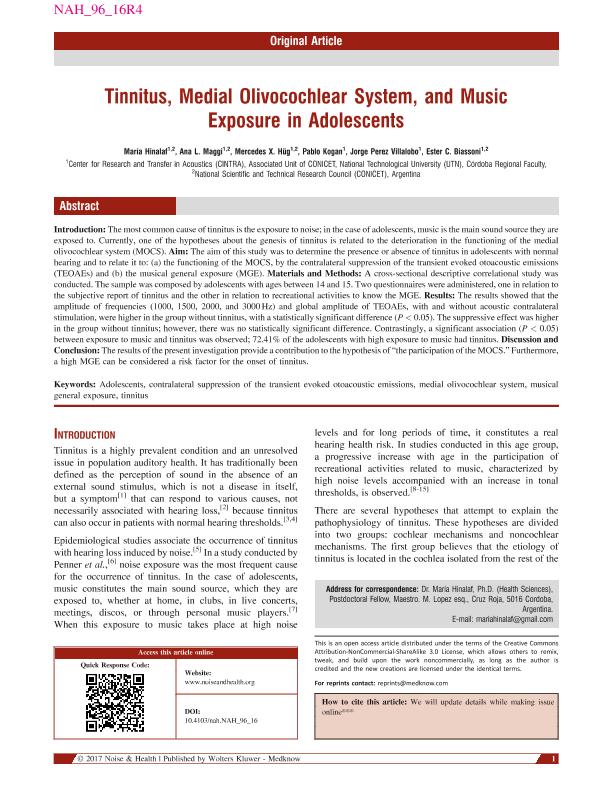Artículo
Tinnitus, medial olivocochlear system and music exposure in adolescents
Hinalaf, María de Los Angeles ; Maggi, Ana Luz
; Maggi, Ana Luz ; Hug, Mercedes Ximena
; Hug, Mercedes Ximena ; Kogan, Pablo; Perez Villalobo, Jorge Alejandro; Biassoni, Ester Cristina
; Kogan, Pablo; Perez Villalobo, Jorge Alejandro; Biassoni, Ester Cristina
 ; Maggi, Ana Luz
; Maggi, Ana Luz ; Hug, Mercedes Ximena
; Hug, Mercedes Ximena ; Kogan, Pablo; Perez Villalobo, Jorge Alejandro; Biassoni, Ester Cristina
; Kogan, Pablo; Perez Villalobo, Jorge Alejandro; Biassoni, Ester Cristina
Fecha de publicación:
17/04/2017
Editorial:
Wolters Kluwer - Medknow Publications
Revista:
Noise and Health
ISSN:
1998-4030
e-ISSN:
1463-1741
Idioma:
Inglés
Tipo de recurso:
Artículo publicado
Clasificación temática:
Resumen
The most common cause of tinnitus is the exposure to noise; in the case of adolescents, music is the main sound source they are exposed to. Currently, one of the hypotheses about the genesis of tinnitus is related to the deterioration in the functioning of the medial olivocochlear system (MOCS). The aim of this study was to determine the presence or absence of tinnitus in adolescents with normal hearing and to relate it to: (a) the functioning of the MOCS, by the contralateral suppression of the transient evoked otoacoustic emissions (TEOAEs) and (b) the musical general exposure (MGE). A cross-sectional descriptive correlational study was conducted. The sample was composed by adolescents with ages between 14 and 15. Two questionnaires were administered, one in relation to the subjective report of tinnitus and the other in relation to recreational activities to know the MGE. The results showed that the amplitude of frequencies (1000, 1500, 2000, and 3000 Hz) and global amplitude of TEOAEs, with and without acoustic contralateral stimulation, were higher in the group without tinnitus, with a statistically significant difference (P < 0.05). The suppressive effect was higher in the group without tinnitus; however, there was no statistically significant difference. Contrastingly, a significant association (P < 0.05) between exposure to music and tinnitus was observed; 72.41% of the adolescents with high exposure to music had tinnitus.Discussion and Conclusion:The results of the present investigation provide a contribution to the hypothesis of "the participation of the MOCS." Furthermore, a high MGE can be considered a risk factor for the onset of tinnitus.
Archivos asociados
Licencia
Identificadores
Colecciones
Articulos(CCT - CORDOBA)
Articulos de CTRO.CIENTIFICO TECNOL.CONICET - CORDOBA
Articulos de CTRO.CIENTIFICO TECNOL.CONICET - CORDOBA
Citación
Hinalaf, María de Los Angeles; Maggi, Ana Luz; Hug, Mercedes Ximena; Kogan, Pablo; Perez Villalobo, Jorge Alejandro; et al.; Tinnitus, medial olivocochlear system and music exposure in adolescents; Wolters Kluwer - Medknow Publications; Noise and Health; 19; 87; 17-4-2017; 95-102
Compartir



